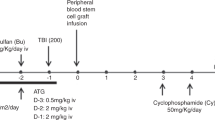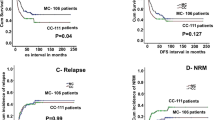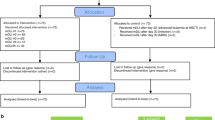Abstract
The prognosis of adult patients with ALL remains unsatisfactory. AlloSCT is associated with a beneficial GVL response mediated by donor T cells. However, GVHD results in substantial mortality and long-term morbidity. T-cell depletion (TCD) of the graft reduces the severity of GVHD, but is associated with an increased relapse rate after alloSCT. Therefore, early sequential donor lymphocyte infusion (DLI) is likely to be necessary for a successful GVL reaction. Twenty-five adult ALL patients (10 Ph+ALL) were eligible for early DLI after initial disease control with myeloablative TCD-alloSCT in first CR (CR1), if active GVHD was absent at 3–6 months after alloSCT. Patients with a sibling donor or an unrelated donor were scheduled for 3.0 × 106 CD3+ cells/kg or 1.5 × 106 CD3+ cells/kg, respectively, at 6 months after alloSCT. Three patients died before evaluation (one early relapse). Five patients had active GVHD. Fourteen of the remaining seventeen patients received DLI (median time-to-DLI: 185 days). Overall, only 17% required long-term systemic immunosuppression for GVHD. With a median follow-up after TCD-alloSCT of 50 months, 2-year survival probability was 68% (95% confidence interval (CI) 49–87%). In conclusion, myeloablative TCD-alloSCT with early sequential DLI is an efficient and safe post-remission treatment for adult ALL patients in CR1.
This is a preview of subscription content, access via your institution
Access options
Subscribe to this journal
Receive 12 print issues and online access
$259.00 per year
only $21.58 per issue
Buy this article
- Purchase on Springer Link
- Instant access to full article PDF
Prices may be subject to local taxes which are calculated during checkout

Similar content being viewed by others
Change history
05 February 2014
This article has been corrected since Online Publication and a corrigendum has also been published.
References
Pulte D, Redaniel MT, Jansen L, Brenner H, Jeffreys M . Recent trends in survival of adult patients with acute leukemia: overall improvements, but persistent and partly increasing disparity in survival of minority patients. Haematologica 2012; 98: 222–229.
Goldberg JD, Linker A, Kuk D, Ratan R, Jurcic J, Barker JN et al. T cell-depleted stem cell transplantation for adults with high-risk acute lymphoblastic leukemia: long-term survival for patients in first complete remission with a decreased risk of graft-versus-host disease. Biol Blood Marrow Transplant 2012; 19: 208–213.
Ram R, Gafter-Gvili A, Vidal L, Paul M, Ben-Bassat I, Shpilberg O et al. Management of adult patients with acute lymphoblastic leukemia in first complete remission: systematic review and meta-analysis. Cancer 2010; 116: 3447–3457.
Willemze R, Labar B . Post-remission treatment for adult patients with acute lymphoblastic leukemia in first remission: is there a role for autologous stem cell transplantation? Semin Hematol 2007; 44: 267–273.
Yanada M, Matsuo K, Suzuki T, Naoe T . Allogeneic hematopoietic stem cell transplantation as part of postremission therapy improves survival for adult patients with high-risk acute lymphoblastic leukemia: a metaanalysis. Cancer 2006; 106: 2657–2663.
Goldstone AH, Richards SM, Lazarus HM, Tallman MS, Buck G, Fielding AK et al. In adults with standard-risk acute lymphoblastic leukemia, the greatest benefit is achieved from a matched sibling allogeneic transplantation in first complete remission, and an autologous transplantation is less effective than conventional consolidation/maintenance chemotherapy in all patients: final results of the International ALL Trial (MRC UKALL XII/ECOG E2993). Blood 2008; 111: 1827–1833.
Gupta V, Richards S, Rowe J . Allogeneic, but not autologous, hematopoietic-cell-transplant improves survival only among younger adults with acute lymphoblastic leukemia in first remission: individual-patient-data meta-analysis. Blood 2012; 121: 339–350.
Ribera JM . Allogeneic stem cell transplantation for adult acute lymphoblastic leukemia: when and how. Haematologica 2011; 96: 1083–1086.
Apperley JF, Jones L, Hale G, Waldmann H, Hows J, Rombos Y et al. Bone marrow transplantation for patients with chronic myeloid leukaemia: T-cell depletion with Campath-1 reduces the incidence of graft-versus-host disease but may increase the risk of leukaemic relapse. Bone Marrow Transplant 1986; 1: 53–66.
Marks DI, Bird JM, Cornish JM, Goulden NJ, Jones CG, Knechtli CJ et al. Unrelated donor bone marrow transplantation for children and adolescents with Philadelphia-positive acute lymphoblastic leukemia. J Clin Oncol 1998; 16: 931–936.
Schaap N, Schattenberg A, Bar B, Preijers F, van de Wiel van Kemenade E, de Witte T . Induction of graft-versus-leukemia to prevent relapse after partially lymphocyte-depleted allogeneic bone marrow transplantation by pre-emptive donor leukocyte infusions. Leukemia 2001; 15: 1339–1346.
Miglino M, Berisso G, Grasso R, Canepa L, Clavio M, Pierri I et al. Allogeneic bone marrow transplantation (BMT) for adults with acute lymphoblastic leukemia (ALL): predictive role of minimal residual disease monitoring on relapse. Bone Marrow Transplant 2002; 30: 579–585.
Chalandon Y, Passweg JR, Schmid C, Olavarria E, Dazzi F, Simula MP et al. Outcome of patients developing GVHD after DLI given to treat CML relapse: a study by the Chronic Leukemia Working Party of the EBMT. Bone Marrow Transplant 2010; 45: 558–564.
Glucksberg H, Storb R, Fefer A, Buckner CD, Neiman PE, Clift RA et al. Clinical manifestations of graft-versus-host disease in human recipients of marrow from HL-A-matched sibling donors. Transplantation 1974; 18: 295–304.
Marijt WA, Heemskerk MH, Kloosterboer FM, Goulmy E, Kester MG, van der Hoorn MA et al. Hematopoiesis-restricted minor histocompatibility antigens HA-1- or HA-2-specific T cells can induce complete remissions of relapsed leukemia. Proc Natl Acad Sci USA 2003; 100: 2742–2747.
Tiribelli M, Sperotto A, Candoni A, Simeone E, Buttignol S, Fanin R . Nilotinib and donor lymphocyte infusion in the treatment of Philadelphia-positive acute lymphoblastic leukemia (Ph+ ALL) relapsing after allogeneic stem cell transplantation and resistant to imatinib. Leuk Res 2009; 33: 174–177.
Pidala J, Anasetti C, Jim H . Quality of life after allogeneic hematopoietic cell transplantation. Blood 2009; 114: 7–19.
Bassan R, Hoelzer D . Modern therapy of acute lymphoblastic leukemia. J Clin Oncol 2011; 29: 532–543.
de Labarthe A, Rousselot P, Huguet-Rigal F, Delabesse E, Witz F, Maury S et al. Imatinib combined with induction or consolidation chemotherapy in patients with de novo Philadelphia chromosome-positive acute lymphoblastic leukemia: results of the GRAAPH-2003 study. Blood 2007; 109: 1408–1413.
Lee S, Kim YJ, Min CK, Kim HJ, Eom KS, Kim DW et al. The effect of first-line imatinib interim therapy on the outcome of allogeneic stem cell transplantation in adults with newly diagnosed Philadelphia chromosome-positive acute lymphoblastic leukemia. Blood 2005; 105: 3449–3457.
Carpenter PA, Snyder DS, Flowers ME, Sanders JE, Gooley TA, Martin PJ et al. Prophylactic administration of imatinib after hematopoietic cell transplantation for high-risk Philadelphia chromosome-positive leukemia. Blood 2007; 109: 2791–2793.
Ribera JM, Oriol A, Gonzalez M, Vidriales B, Brunet S, Esteve J et al. Concurrent intensive chemotherapy and imatinib before and after stem cell transplantation in newly diagnosed Philadelphia chromosome-positive acute lymphoblastic leukemia. Final results of the CSTIBES02 trial. Haematologica 2010; 95: 87–95.
Gokbuget N, Stanze D, Beck J, Diedrich H, Horst HA, Huttmann A et al. Outcome of relapsed adult lymphoblastic leukemia depends on response to salvage chemotherapy, prognostic factors and realization of stem cell transplantation. Blood 2012; 120: 2032–2041.
Posthuma EF, Marijt EW, Barge RM, van Soest RA, Baas IO, Starrenburg CW et al. Alpha-interferon with very-low-dose donor lymphocyte infusion for hematologic or cytogenetic relapse of chronic myeloid leukemia induces rapid and durable complete remissions and is associated with acceptable graft-versus-host disease. Biol Blood Marrow Transplant 2004; 10: 204–212.
Bachanova V, Verneris MR, DeFor T, Brunstein CG, Weisdorf DJ . Prolonged survival in adults with acute lymphoblastic leukemia after reduced-intensity conditioning with cord blood or sibling donor transplantation. Blood 2009; 113: 2902–2905.
Acknowledgements
This work was supported by research grant 2008-4263 from the Dutch Cancer Society, Amsterdam, The Netherlands.
Author information
Authors and Affiliations
Corresponding author
Ethics declarations
Competing interests
The authors declare no conflict of interest.
Rights and permissions
About this article
Cite this article
Eefting, M., Halkes, C., de Wreede, L. et al. Myeloablative T cell-depleted alloSCT with early sequential prophylactic donor lymphocyte infusion is an efficient and safe post-remission treatment for adult ALL. Bone Marrow Transplant 49, 287–291 (2014). https://doi.org/10.1038/bmt.2013.111
Received:
Revised:
Accepted:
Published:
Issue Date:
DOI: https://doi.org/10.1038/bmt.2013.111
Keywords
This article is cited by
-
The graft-versus-leukemia effect of prophylactic donor lymphocyte infusions after allogeneic stem cell transplantation is equally effective in relapse prevention but safer compared to spontaneous graft-versus-host disease
Annals of Hematology (2023)
-
Post-transplant maintenance therapy in acute myeloid leukemia after allogeneic hematopoietic stem cell transplantation harmonizing multiple therapeutic modalities including targeted therapy, immunotherapy and cellular therapy
International Journal of Hematology (2023)
-
Pre-emptive and prophylactic donor lymphocyte infusion following allogeneic stem cell transplantation
International Journal of Hematology (2023)
-
Long-term results and GvHD after prophylactic and preemptive donor lymphocyte infusion after allogeneic stem cell transplantation for acute leukemia
Bone Marrow Transplantation (2022)
-
Prophylactic modified donor lymphocyte infusion after low-dose ATG-F-based haploidentical HSCT with myeloablative conditioning in high-risk acute leukemia: a matched-pair analysis
Bone Marrow Transplantation (2021)



